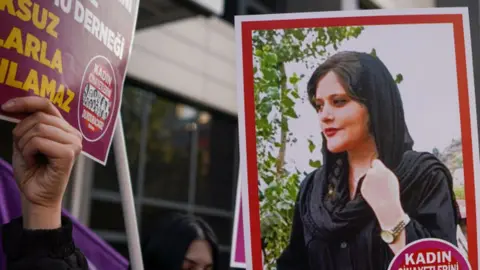Uncertainty over Iran’s morality police after official's 'disbanded' remarks
 Getty Images
Getty ImagesThere is uncertainty over the status of Iran's morality police, which enforces its dress code, after a senior official suggested that it had been disbanded.
When asked about the Guidance Patrol at a conference, Attorney General Mohammad Jafar Montazeri said they "have been shut down from where they were set up".
However, the government did not confirm the move and local media reported that his remarks had been "misinterpreted".
The death of a woman detained by the force has sparked nationwide protests.
Mahsa Amini, 22, collapsed and fell into a coma shortly after being arrested in Tehran on 13 September for allegedly violating the rule requiring women to cover their hair with a hijab, or headscarf.
There were reports that morality police officers beat her head with a baton. The police said she suffered a heart attack.
Anti-government protests - labelled "riots" by Iranian authorities - swept across Iran after Ms Amini died in hospital on 16 September.
But while her death was the catalyst for the unrest, it has also been driven by long-standing discontent over poverty, unemployment, inequality, injustice and corruption.
Iran has had various forms of "morality police" since the 1979 Islamic Revolution, but the latest version - known formally as the Guidance Patrol (Gasht-e Ershad) - is currently the main agency tasked enforcing Iran's Islamic code of conduct.
They began their patrols in 2006 to enforce the dress code which also requires women to wear long clothes and forbids shorts, ripped jeans and other clothes deemed immodest.
Mr Montazeri was a religious conference when he was asked about the Guidance Patrol.
"The morality police had nothing to do with the judiciary and have been shut down from where they were set up," he said.
However, he stressed that the judiciary would continue "to monitor behavioural actions at the community level".
The Guidance Patrol is part of the national police force and control lies with the interior ministry and not with the judiciary.
After the BBC and other foreign media picked up the attorney general's statement, some Iranian state media outlets pushed back on the morality police had been disbanded.
State-run Arabic-language TV channel Al-Alam said some had "tried to misinterpret" what the attorney general said.
"The most that can be understood from Mohammed Jafar Montazeri's remarks is that the morality police's patrols have not been connected to the judiciary since their inception."
Conservative outlet Student News Network (SNN) dismissed the "false headlines" and stressed that observing hijab is "still a law in Iran".
However, the reformist Sharq newspaper said it had approached the public relations office of Tehran's police force but that officials had "dodged" its question on disbanding the Guidance Patrol.
And when asked about Mr Montazeri's remarks during a visit to Serbia, Iranian Foreign Minister Hossein Amir-Abdollahian neither confirmed nor denied that they were correct.
"In Iran, everything is moving forward well in the framework of democracy and freedom," he said.
On Saturday, Mr Montazeri also told the Iranian parliament the law that requires women to wear hijabs would be looked at.
'A revolution is what we have'
If confirmed, the scrapping of the morality police would be a concession to the protesters.
But there are no guarantees it would be enough to halt the unrest, which has seen women waving their headscarves in the air and setting them on fire.
"Just because the government has decided to dismantle morality police it doesn't mean the protests are ending," one Iranian woman told the BBC World Service's Newshour programme.
"Even the government saying the hijab is a personal choice is not enough. People know Iran has no future with this government in power. We will see more people from different factions of Iranian society, moderate and traditional, coming out in support of women to get more of their rights back."
Another woman said: "We, the protesters, don't care about no hijab no more. We've been going out without it for the past 70 days.
"A revolution is what we have. Hijab was the start of it and we don't want anything, anything less, but death for the dictator and a regime change."
US Secretary of State Antony Blinken said the abolition of Iran's morality police could be "a positive thing" and praised the "extraordinary courage of Iranian young people, especially women, who've been leading these protests".
"If the regime has now responded in some fashion, to those protests, that could be a positive thing," he added.
